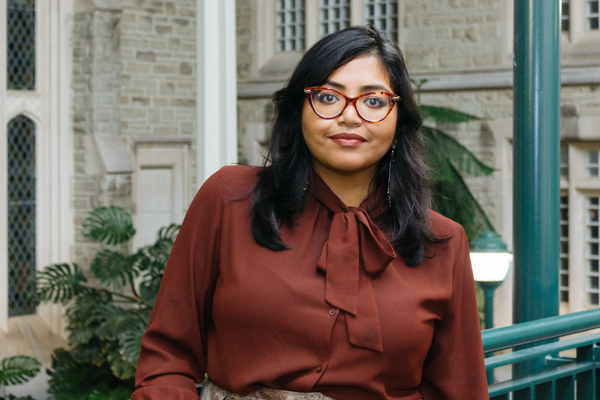Admissions
Equity, Diversity, Inclusion and Decolonization
The School of Graduate and Postdoctoral Studies is committed to equity, diversity, inclusion and decolonization in all aspects of graduate and postdoctoral studies. For more information regarding these commitments please visit grad.uwo.ca/edi-d.
Visual Arts
Doctor of Philosophy (PhD)Meet Iraboty Kazi, PhD candidate in Visual Arts

Describe your research.
My dissertation explores how pastoral spaces represented in Italian early modern paintings are reconfigured in constructions of nature in contemporary queer cinema. Using Foucault’s concept of the heterotopia, I examine how queer cinema remediates these spaces to challenge the heteronormative gaze, thus shifting conceptions of the pastoral from idyllic and escapist places to sites of resistance that enable construction, representation, and negotiation of queer identities.
Where’s your favourite place on campus to work?
I have two: the PhD office in the Visual Arts Centre. I love having my own desk! It’s probably not the best place to actually get work done because I get easily distracted by my friends walking in the hallway and often end up chatting with them. I value these social interactions and believe that they are important part of my “work” process. My other favorite place is the Pride Library (inside Weldon). It’s not only cozy and beautiful, but the collection is fantastic!
What’s the best advice you could give to someone considering applying to your graduate program?
Don’t just focus on the academic side of the program. Make a list of priorities outside of your research, and assess how this program will cater to those parts of your life. You will be spending years of your life in this program, so it’s important think of the people in the department, the resources/support available, etc.
Have you worked as a teaching or research assistant?
Yes, I have done both. Working as an RA helped me be part of various projects, and gain experience doing research outside my area of expertise. Being a TA has helped improve my communications and time management skills. I also learned a lot from observing the different teaching styles of the professors.
Program Websites
Program Contact
Linda Meloche (vagrads@uwo.ca)Department of Visual Arts
Western UniversityJohn Labatt Visual Arts Centre
London, Ontario N6A 5B7
t. 519-661-2111 ext. 83440
f. 519-661-2020
The PhD in Art and Visual Culture provides advanced training in art history, visual culture, curatorial studies, and studio practices in contemporary art and new media.The program prepares its graduates for professional careers in galleries, museums and other art world contexts; for university teaching and research; and for arts administration in the private and public sectors. The program is unique in that it emphasizes the interrelationship between art historical/visual culture scholarship and studio practice by fostering academic and creative research beside and in connection with each other.

The Own Your Future doctoral professional development program will help you become a career-ready graduate with the skills necessary to excel in your studies and achieve your future goals. By participating in the program, you will assess your own strengths and opportunities for growth, choose what skills you want to enhance during your time at Western, and learn how to articulate the skills you gained in your degree to optimize your future career opportunities. To learn more, visit www.uwo.ca/ownyourfuture.
Program Length
- 12 Terms
Program Design
- Full-time study
- Thesis-based
Funding Information
Applicants are encouraged to apply for the following scholarships (if eligible):
Tuition and Fees
Tuition and fee schedules (per term) are posted on the Office of the Registrar's website at http://www.registrar.uwo.ca/student_finances/fees_refunds/fee_schedules.html
Graduate Student Affordability Calculator
Use this helpful tool to estimate how much money you will need to pay for your tuition, fees, housing, food, and other necessities for a 12-month (three term) academic year.
Admission Requirements
- An MA degree in art history, visual culture or curatorial studies or an MFA or MVA with an average of at least 80% (A-).
Students with equivalent qualifications in relevant visual fields such as film or media studies will also be considered if they can demonstrate significant professional experience and accomplishments in the field.
Additional Requirements
- Students must submit samples of their work. In the case of art history students, this will likely be a sample term paper, thesis chapter or publication. In the case of studio students, this would consist of photographic, video or digital documentation of their studio practice as well as a writing sample.
English Language Proficiency
Applicants whose first language is not English must furnish evidence of their proficiency in the use of the English language by a satisfactory* achievement within the last two years in one of the following:
- The Test of English as a Foreign Language(TOEFL). iBT (internet-Based Test): The minimum acceptable score is 86, with no individual score below 20.
- The International English Language Testing Service (IELTS Academic). The minimum acceptable score is 6.5 out of 9.
- The Duolingo English Test. Applicants must attain a minimum score of 115.
- The Canadian Academic English Language Assessment (CAEL Assessment). The minimum acceptable score is 60.
- Western English Language Centre. The requirement is successful completion of the High-Advanced level.
- Fanshawe College’s ESL Program. The requirement is graduation from Level 10, English for Academic Purposes, with a minimum 80% in all components.
*Programs at Western may require a higher minimum score than those listed above.
Students who are required to present evidence of proficiency in English must make their own arrangements to complete one of the above tests or programs and to have the official results sent directly to the School of Graduate and Postdoctoral Studies by the testing agency.
Exemptions
Students must contact the graduate program(s) to which they have applied in order to request an exemption.
Application Deadline
- January 15 - Acceptance notification in March






